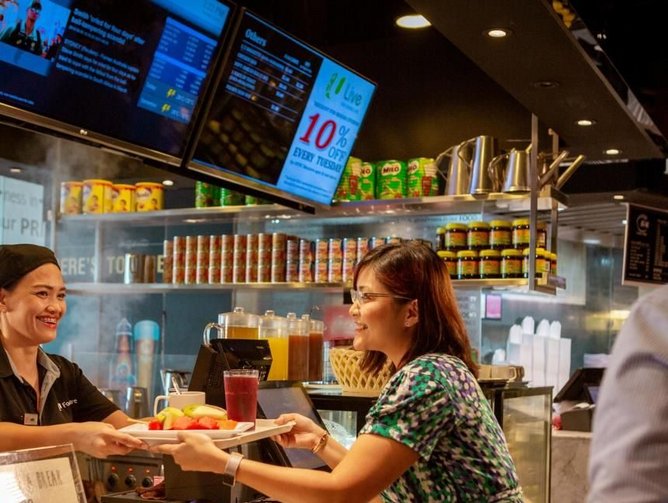It is a testament to any company if it can sustain an enduring legacy in its hometown that spreads over decades. Yet NTUC Enterprise has managed to do more than just maintain an expanding level of popularity and ambition in Singapore for 50 years. Comprised of 10 separate NTUC Social Enterprises (such as FairPrice, Foodfare, Health and Income), the holding company combines the public and private sectors to find solutions to consumer issues. With a corporate reach that serves over two million Singaporeans every day (33% of the population), NTUC Enterprise has attained the rare status of a national institution; its deeply humanitarian mission to harness social enterprises to address social needs is keenly felt by Singapore’s citizens every day.
Drawn to the company’s ethics and particularly the challenges of its digital transformation, Johnny Wong became the Group Chief Digital and Technology Officer (CDTO) of NTUC Enterprise and FairPrice in 2018. Coming from a background which included tenures at Oracle, Google, MercadoLibre and Lazada, Wong gained valuable experience that would serve him well for the future. “I was in charge of managing product development and the engineering to create products for end-users,” he explains. “NTUC Enterprise is a unique organisation; a socially-minded commercial organisation, with a strong partnership with the government and the labor unions, for the benefit of the Singapore society. It’s a very rare model, and I would say, a truly Singaporean partnership model.”
However, when Wong joined the company, he discovered that NTUC Enterprise’s heritage was, in some regards, both a blessing and an obstacle. After decades of successful operations, the company had, from a technological point-of-view and mindset, not made much advancement. “It was very much a traditional organisation, with strong operations and people values, but technology had taken a backseat,” he says. “My goal was to make it much more forward-looking and change into an organisation that’s able to shape its own destiny when it comes to digital transformation.” This bold ambition required a well-thought-out strategy and answers to key questions. What does digital transformation mean for a group of social enterprises? What positive effects will it have for the customer? Recognising that answering these questions would require a new approach, Wong implemented a ‘three pillar’ plan focusing on digital strategies, organisational capabilities and a cultural mindset shift. NTUC Enterprise then defined digital strategies for its main businesses and added over 200 new staff to achieve a new vision, including software engineers, UX researchers and product designers, data scientists and engineers, cybersecurity specialists, technologiests, enterprise system experts, and more.
“We need to see how our customers are evolving and how we can serve them better,” says Wong. “Unless organisations adapt to the future, they will become irrelevant. We leverage data and new technology to better compete in a rapidly changing world.” This is particularly true in NTUC Enterprise’s case, which maintains a large network of brick and mortar (B&M) stores in addition to its online presence. “NTUC Enterprise is about serving working people and the broader interests of the Singapore community across a range of social needs,” he emphasises. Viewing digital transformation as the route to achieving this goal in 2020 and beyond, Wong committed wholeheartedly to the endeavour. “Part of the allure for new talent to join us is knowing that, in improving NTUC’s group of social enterprises, they are also contributing to the improvement of Singapore’s citizens’ lives and to making a better society,” he explains.
For NTUC’s FairPrice platform, Wong relaunched its ecommerce, enabling Singaporeans to shop for groceries, household essentials and other consumer products. Now providing an easy online shopping experience, available through all standard devices (smartphones, tablets, computers, etc), FairPrice has grown its market share to become the second-largest online grocery provider in the country and the fastest growing during 2019. Utilising its network of B&M stores - which Wong calls the company’s “bread and butter” - in conjunction with its online portal, Wong believes that FairPrice can offer an unparalleled level of convenience and customer service whether online or offline. “With our omnichannel strategy, we're able to provide same-day delivery on groceries, sometimes even within two hours. Our rivals might be able to move small items quickly, but they can’t effectively deliver fresh grocery products to peoples’ doorsteps unless they also have an equivalent physical infrastructure nearby.”
Although Wong’s vision for FairPrice has achieved some validation from current business growth, he explains that, in the initial stages, there was strong debate internally. Prior to the transformation, NTUC Fairprice was “a traditional retailer that, in regards to technology, operated in essentially the same way as it had for the last 20 to 30 years and had been very successful,” Wong describes. There were many discussions among executives and board members on whether business should carry on as normal “with some minor optimisations”, or if NTUC Fairprice should act upon trends spearheaded by ecommerce leaders like Amazon. “After all,” he says, “it's not just about simply hiring engineers or putting together a nice PowerPoint; it’s about changing pre-existing mindset; it’s about fundamentally altering the way that our organisation works and invests, and that’s very different.” However, Wong’s conviction that a digital and data-centric approach won out and proved that intelligent implementation of new technology can pay dividends.
Data collected by the company comes from across NTUC Enterprise’s various social enterprises, making the information can be varied and voluminous. “From groceries to the food required in food courts and restaurants to the health clinics and childcare centres, we collect individual data signals,” Wong explains.” Based on that, we develop a fairly good view of the customer journey and can offer better products and services.” However, with so much information to process, new methods to effectively analyse it became necessary. Data science and particularly machine learning became a focus for the company. “We need to make use of and understand data. We have about 40 different data scientists and machine learning engineers working on forecasting, marketing and search engine optimisation,” he says.
However, despite the company’s dedication to thoroughly modernising its operations, NTUC Enterprise is always careful to ensure its central concern remains the same: people. In 2019, the company held an initiative to help Singaporeans manage daily struggles such as the cost of living. Wong maintains that if an aspect of digitalisation doesn’t help ordinary working people, there is little use for it. “At FairPrice, our social mission is to help moderate the cost of living from groceries products. We help keep the prices down through both traditional optimizations, and also by making use of technology through better demand forecasting and reducing waste - other grocery retailers actually benchmark their prices against ours.” It is both the company’s assiduousness and strong online/offline infrastructure that Wong believes will expand the company within Singapore and beyond. “Whereas some of the big ecommerce players are wanting to go offline, and many of the offline players are dreaming of going online, we are the only ones that don't have to dream; we have the omnichannel capabilities.”




